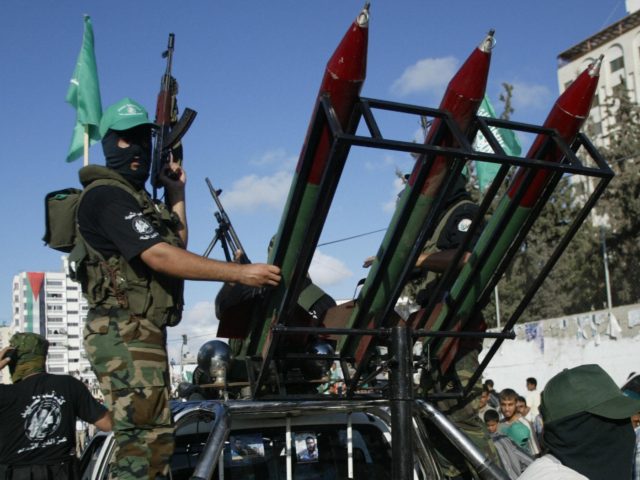TEL AVIV, Israel — Israel is preparing for the possibility that the Hamas terror organization in Gaza and the Hezbollah terror group in Lebanon may attack using various liquid fentanyl variants, designed to incapacitate and kill large numbers of people.
The Magen David Adom (MDA), Israel’s version of the Red Cross, sent an alert to staffers this week telling them that Israel’s health authorities had warned the MDA to prepare for the possibility that terror organizations might cause a mass casualty event using opioids from the fentanyl class of compounds. The MDA asked staff members to familiarize themselves with the protocol for treating a mass casualty event triggered by fentanyl.
Though the MDA alert did not mention rockets specifically, a source told Breitbart News that a few rockets with chemical capabilities had been found in Gaza. The Israel Defense Forces (IDF) also said in a statement Sunday that some Hamas weapons recovered in the area of Beit Hanoun had been “brought to Israel for further examination,” without elaboration. There currently is no known way to use rockets to disperse fentanyl, as it is believed the explosion would destroy the drug, rendering it harmless. However, there may be other ways to weaponize fentanyl.
Fentanyl is well known for its dangers as a narcotic in the United States. It has also been used as a chemical weapon before, according to a 2019 paper published by the Center for the Study of Weapons of Mass Destruction at the National Defense University:
It is less well known that fentanyl and its analogues have been investigated as incapacitating agents by a number of countries.
…
[The U.S. Department of Defense] saw promise in fentanyl and some of its analogues, or a combination of such compounds, for incapacitation, but did not solve the margin of safety issue prior to the program’s termination. Margin of safety refers to the difference between a dosage that will incapacitate and one that will kill a person.
…
Russia employed fentanyl analogues in a counterterrorism role in October 2002. Forty Chechen terrorists seized Moscow’s Dubrovka Theater and more than 800 hostages, strung explosives around the theater, and threatened to destroy it and kill the hostages unless Russia agreed to end its military campaign in Chechnya. After several days of unsuccessful negotiations and the Chechens’ threat that it would start killing hostages, Russian security forces pumped an aerosolized combination of two fentanyl analogues into the theater to incapacitate the inhabitants and permit the building to be stormed. The terrorists and approximately 130 of the hostages were killed. Most hostages died from exposure to a lethal dose of the fentanyl compounds (recall that margin of safety issue discussed earlier). (Original emphasis)
However, it is unclear how exactly fentanyl would be dispersed to avoid vaporization. It may need to be in the form of an aerosol to survive impact or explosion. The Arms Control Association notes that chemical weapons typically require a mechanism that expels a chemical agent through an explosive charge. Other methods to disperse agents, however, do not require rockets.
The MDA told staff that syringes with antidotes to opioids would be distributed as they became available. However, a source told Breitbart News that there is a fear that the country would not have enough antidotes to deal with the scale of possible attacks.
Chemical weapons have been referred to once before in the ongoing conflict. Israel’s ceremonial president, Isaac Herzog, told Sky News last month that some Hamas terrorists who infiltrated the country on October 7 were found with USB drives containing instructions for making cyanide weapons.
Update: This article has been corrected to note that delivery of fentanyl as a chemical weapon would be highly unlikely via rocket, though it could be delivered through other means.
Joel B. Pollak is Senior Editor-at-Large at Breitbart News and the host of Breitbart News Sunday on Sirius XM Patriot on Sunday evenings from 7 p.m. to 10 p.m. ET (4 p.m. to 7 p.m. PT). He is the author of the new biography, Rhoda: ‘Comrade Kadalie, You Are Out of Order’. He is also the author of the recent e-book, Neither Free nor Fair: The 2020 U.S. Presidential Election. He is a winner of the 2018 Robert Novak Journalism Alumni Fellowship. Follow him on Twitter at @joelpollak.

COMMENTS
Please let us know if you're having issues with commenting.